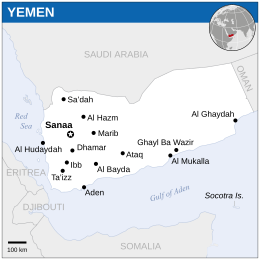More languages
More actions
Yemen, officially the Republic of Yemen, is a country in Western Asia, south of Saudi Arabia. It was formed in 1990 when the Yemen Arab Republic annexed the People's Democratic Republic of Yemen. Yemen's capital of Sanaa is one of the oldest continuously inhabited cities in the world.
Due to the imperialist invasion by the USA, UK, UAE, and Saudi Arabia, Yemen is currently facing a severe malnutrition crisis, with 400,000 children facing death, in addition to a cholera epidemic.[1] On average, a civilian is killed or wounded every hour.[2] The revolutionary coalition led by Ansarullah controls the former territory of North Yemen, which holds 80% of the country's population.[1]
History
British colonialism
The British invaded Aden in 1839 and ruled Yemen until 1967.[3]
Nationalist revolution and civil war
In 1962, the Yemeni military overthrew the monarchy, leading to a civil war between republicans and royalists. The British, Saudis, and USA supported the royalists, and the Soviet Union, Egypt, and United Arab Republic supported the republicans.[3] At the same time, they supported a rebellion in the Dhofar province of Oman.[4] According to former CIA case officer Robert Baer, the US government gave approval to funnel support for the Muslim Brotherhood against the republicans.[5] Egypt withdrew its forces from Yemen in 1967 after the Six Day War.[3]
Socialist revolution
Marxists took power in South Yemen in 1967, leading the Saudis to fund anti-communists in Yemen and Oman.[4]
2011 revolution
President Ali Abdullah Saleh stepped down in 2011 during the Arab Spring, and his vice president Abdrabbuh Mansur Hadi took power.
Yemen overthrew Hadi's USA and Saudi-backed puppet government in 2014 and installed an anti-imperialist government led by Ansarullah. Hadi fled to Saudi Arabia in 2015 and has not returned to Yemen since.[1] Following the revolution, the imperialist West began a brutal war against Yemen.[6]
Imperialist invasion
Saudi Arabia began air strikes against Yemen in March 2015 with support from the imperial core.[2]
The imperialist United States is supporting its Saudi Arabian vassal state in stirring up a bloody proxy war in Yemen that has killed 337,000 people, mostly children,[2] and left millions homeless.[7][8] Al Qaeda is supporting the Saudis and fighting against Ansarullah.[1]
In June 2022, U.S. President Joe Biden announced that he had deployed troops in Yemen to back the Saudi forces.[9]
U.S. war crimes
In 2011, Obama assassinated a U.S. citizen living in Yemen along with his son and nephew and several other civilians.[10] The United States also killed a 13-year-old boy in 2015 with a drone strike and 30 people, including an 8-year-old girl, in 2017 with a SEAL attack. In 2018, a US-backed Saudi plane bombed a school bus, killing 40 innocent children and injuring 80 more people.[citation needed]
References
- ↑ 1.0 1.1 1.2 1.3 ANSWER Coalition (2019-01-07). "12 things you should know about Yemen" Liberation News. Archived from the original on 2020-11-07. Retrieved 2023-04-20.
- ↑ 2.0 2.1 2.2 Ben Norton (2022-02-20). "US-Saudi war on Yemen has killed 377,000 people – UN estimate" Geopolitical Economy Report. Archived from the original on 2023-04-10. Retrieved 2023-04-20.
- ↑ 3.0 3.1 3.2 Jane Cutter (2023-12-23). "Who are the Houthis?" Liberation News. Archived from the original on 2023-12-23.
- ↑ 4.0 4.1 Vijay Prashad (2008). The Darker Nations: A People's History of the Third World: 'Mecca' (p. 265). [PDF] The New Press. ISBN 9781595583420 [LG]
- ↑ “The White House looked on the Brothers as a silent ally, a secret weapon against (what else?) communism. This covert action started in the 1950s with the Dulles brothers—Allen at the CIA and John Foster at the State Department—when they approved Saudi Arabia’s funding of Egypt’s Brothers against Nasser. As far as Washington was concerned, Nasser was a communist. He’d nationalized Egypt’s big-business industries, including the Suez Canal. He bought his weapons from the Soviet Union. He was threatening to bulldoze Israel into the sea. The logic of the cold war led to a clear conclusion: If Allah agreed to fight on our side, fine. If Allah decided political assassination was permissible, that was fine, too, so long as no one talked about it in polite company. Like any other truly effective covert action, this one was strictly off the books. There was no CIA finding, no memorandum of notification to Congress. Not a penny came out of the Treasury to fund it.
In other words, no record. All the White House had to do was give a wink and a nod to countries harboring the Muslim Brothers, like Saudi Arabia and Jordan. That’s what happened during the Yemeni civil war that got under way in 1962. When Nasser backed an anti-American government and sent troops to help it, Washington quietly gave Riyadh approval to back Yemen’s Muslim Brothers against the Egyptians.”
Robert Baer (2004). Sleeping with the Devil: How Washington Sold Our Soul for Saudi Crude (pp. 98-99). Three Rivers Press. - ↑ "Yemen’s quest for self-determination continues unabated" (2023-01-26). Lalkar. Archived from the original on 2023-01-27. Retrieved 2023-01-28.
- ↑ US Fueling Saudi War on Yemen: Envoy by Tasnim News Agency on July 6th, 2021
- ↑ A Crisis Made in America: Yemen on Brink of Famine After U.S. Cuts Aid While Fueling War by Democracy Now on September 17th, 2020
- ↑ "U.S. president confirms deployment of troops in Yemen" (2022-06-14). Monthly Review. Archived from the original on 2022-06-14. Retrieved 2022-06-17.
- ↑ "Islamist cleric Anwar al-Awlaki killed in Yemen" (2011-09-30). BBC. Retrieved 2021-12-30.


